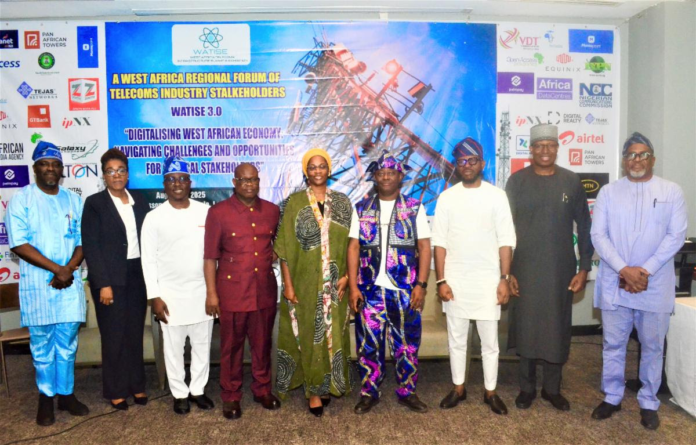THE Federal Government, Nigerian Communications Commission (NCC) and telecom operators on Tuesday renewed calls for urgent collaboration to close the skill gaps threatening the future of Nigeria’s telecom industry.
The call was made at the Stakeholders’ Consultative Forum on Skill Gaps in the Telecoms Value Chain held in Lagos on Tuesday
The Executive Vice-Chairman of NCC, Dr Aminu Maida, who was represented by Mr Edoyemi Ogoh, Director, Technical Standards and Network Integrity, said the shortage of indigenous talent had become one of the most pressing challenges facing the sector.
Maida said that since the liberalisation of the industry in 2001, telecoms had created over 500,000 jobs, improved connectivity and powered economic growth, noting that the progress was now under threat.
“Studies, including the 2024 ITU assessment, reveal that while employers require about 30 per cent of advanced digital skills, only 11 per cent of employed workers currently possess them.
“Critical roles such as desktop support technicians, data analysts, ICT engineers, software developers and data scientists already account for 25 per cent of jobs, but 27 per cent of these are hard to fill, with demand expected to rise by 29 per cent in the next five years,” he said.
According to Maida, the challenges fueling the gaps include capital flight due to reliance on expatriates and poor remuneration discouraging retention.
He also listed weak alignment of education with industry needs, and high global demand luring skilled Nigerians abroad.
The NCC boss said that government interventions to close the gaps included the 3 Million Technical Talent (3MTT) programme, the Digital States Programme and the National Artificial Intelligence Strategy (NAIS).
He noted that the National Digital Literacy Framework (NDLF) was also meant to close the skill gaps.
He added that the NCC itself had rolled out initiatives such as the Digital Learning Initiative (DLI) for schools and the Campus Innovation Entrepreneurship Programme (CIEP) for undergraduates.
Maida said the Advanced Digital Empowerment Tertiary Programme (ADEPTI), ADAPTI and the Digital Awareness Programme (DAP) were also NCC initiatives.
“One of our DAP projects in GDSS Malabu, Adamawa, won the 2025 World Summit on Information Society Award in the Access to Information and Knowledge category.
“Private operators are also contributing, with Airtel Africa committing to train 25,000 youths and supporting UNICEF digital learning platforms in 1,260 schools.
“MTN Foundation funds scholarships in STEM and inclusive education, while ATCON Academy and IHS Digital Hub have launched targeted training and incubation schemes.
In his remarks, Chairman of the Association of Licensed Telecoms Operators of Nigeria (ALTON), Mr Gbenga Adebayo, said while Nigeria was producing high-end professionals in AI and advanced technology, the industry lacked sufficient mid-level workers such as technicians, riggers and engineers.
“These so-called small skills are critical. In four years, I lost 12 skilled technicians in my company to Canada, Germany, the U.S. and the UK.
“It’s not just about training them, but also about retaining them with better incentives and social guarantees,” he said.
Adebayo called for the establishment of a Nigerian Telecom Academy to provide one-year and three-year certifications, modeled after the Petroleum Training Institute in Warri.
He also urged the Digital Bridge Institute (DBI) to integrate more practical skills, with operators sponsoring campuses to provide scholarships, certification and job pathways.
“Countries with the strongest industries not only train but also retain their workforce.
“We must create pathways for skilled Nigerians abroad to contribute back home, even as consultants. Growth is never comfortable, but if we address these gaps, our industry will be stronger,” he added.
The News Agency of Nigeria (NAN) reports that the forum featured breakout sessions where stakeholders developed recommendations on building indigenous technical, software, business and soft skills required to drive Nigeria’s digital economy.(NAN)
No Plans To Implement 5% Fuel Tax Anytime Soon – Wale Edun
Finance Minister Wale Edun has clarified that there are no immediate plans to implement the proposed 5 per cent tax on petroleum products.
Speaking to reporters in Abuja on Tuesday, the Minister explained that although the policy is included in the new tax administration set to take effect on January 1, 2026, its implementation will not proceed without following all formal processes involved.
The minister’s explanations follow growing concerns regarding the implementation of the 5 per cent fuel tax.
Addressing the tax, Edun clarified that the surcharge is a long-standing provision, originally introduced in 2007 under the Federal Road Maintenance Agency (FERMA) Act, and is not a new tax introduced by President Bola Tinubu’s administration.
The minister further explained that the inclusion of the surcharge in the 2025 Act is aimed at consolidating and harmonizing existing laws for greater clarity and easier compliance.
He said, “The tax reform bills and the tax act would not become operational until January 1, 2026, and the 5 per cent fuel surcharge which is mentioned therein will not automatically come into effect. There is even a process.
“Before any surcharge can come into effect it requires the commencement order from the honourable Minister of Finance and this indeed must be published in a gazette, so it is not automatic that we will wake up on January 1 and there is a new tax.
“There is a whole formal process involved and as at today no order has been issued, no is being prepared and there is no immediate plan to implement any surcharge.”
On Monday, the Trade Union Congress (TUC) rejected the 5 per cent tax on petroleum products, describing it as a “reckless proposal” which is “nothing but an act of economic wickedness against already overburdened Nigerians”.
The union said that the government policy, if implemented, would compound suffering, cripple businesses, and push millions of citizens deeper into poverty.
It stated that the Federal Government cannot continue to use Nigerians as sacrificial lambs for its economic experiments



